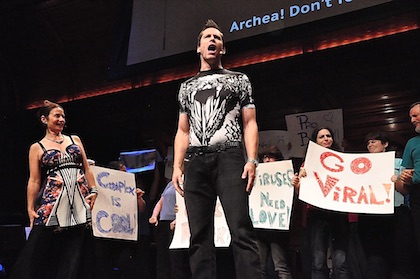Act 1 of the 3-act mini-opera “The Best Life”, about about a competition to choose the best species of life — that’s this week’s Improbable Research podcast.
SUBSCRIBE on Play.it, iTunes, or Spotify to get a new episode every week, free.
This week, Marc Abrahams introduces Act 1 of the mini-opera “The Best Life,” which premiered as part of the 2015 Ig Nobel Prize Ceremony, at Harvard’s Sanders Theatre. This is a recording from that performance:
- The plot of Act 1: [As you’ll hear the narrator, Karen Hopkin, explain:] It’s the day before The Greatest Competition Ever Held — a competition to choose which ONE of the millions of species of life is… THE BEST LIFE. The competition will be televised live, everywhere — and the public is going nuts, eager to pay huge prices to watch it live. All the species of life — every single species, millions of them! — are going to be together, IN ONE ROOM, for the competition. There has never, ever been such a gathering, except maybe in a biblical sense, if you want to savor that story ark. Let’s watch the two organizers — giddy with nervous excitement, as they do last-minute preparation. If you listen closely, you might also hear the choral voices of seven billion humans, expressing their anticipation at the imminent television event of the century.
- The libretto: The entire libretto is included in IgBill, the printed program that was handed out to all 1100 people who attended that performance. You can download your own copy of IgBill, and read along as you hear the singers sing and the instrumentalists do whatever it is they are doing.
- The creators/producers: The music is by Giuseppe Verdi and Arthur Sullivan, the story and words by Marc Abrahams. The performance was directed by Maria Ferrante, assisted by Robin Abrahams, and costumed by Catherine Quick Spingler.
- The performers: starring Maria Ferrante, Scott Taylor, and Daniel Rosenberg,
with The All-Species Chorus — Delphine Gabbay (chorus wrangler), Erika Hutchinson, Sylvia Rosenberg, Julia Lunetta, Vicki Bloom, Ros (Rosalind) Reid, Natasha Rosenberg, Abby Schiff, Vijaya Sundaram, Rob Hart, Liz Oppenheim, Warren Senders, Ted Sharpe, Nick Carstoiu, et al. The chorus ranks were swelled, in Act 3 of the opera, by addition of Nobel laureates Dudley Herschbach (chemistry, 1986), Carol Greider (physiology or medicine, 2009), Frank Wilczek (physics, 2004), Jack Szostak (physiology or medicine, 2009), and Eric Maskin (economics, 2007). The singers were backed by the Concentrated Forces of Nature, a distilled orchestra composed entirely of Harvard Medical School researchers Patrick Yacono and Dr. Thomas Michel. - Libretto plus: The libretto also appears, with photos from opera and juicy details from the entire the Ig Nobel ceremony, in the special 2015 Ig Nobel issue of our magazine, the Annals of Improbable Research. Here’s a photo (by ace photographer David Holzman) from Act 1:

The mysterious John Schedler or the shadowy Bruce Petschek perhaps did the sound engineering this week.
The Improbable Research podcast is all about research that makes people LAUGH, then THINK — real research, about anything and everything, from everywhere —research that may be good or bad, important or trivial, valuable or worthless. CBS distributes it, on the CBS Play.it web site, and on iTunes and Spotify).